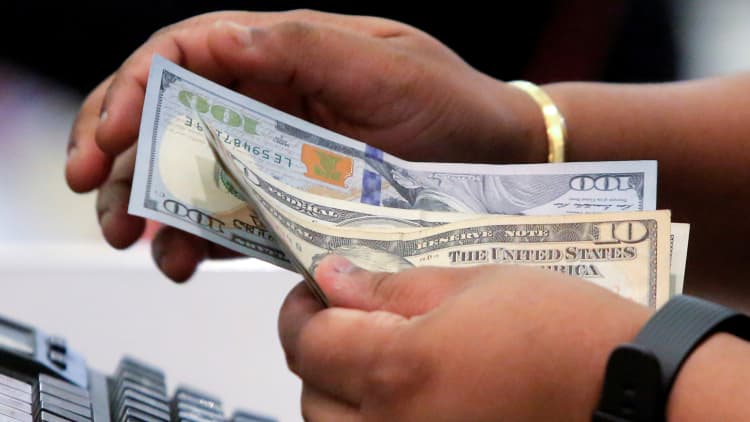
Credit card debt has notched another new high.
Americans now owe $1.13 trillion on their credit cards, the Federal Reserve Bank of New York reported Tuesday.
Balances jumped 10% from a year ago, according to a separate quarterly credit industry insights report from TransUnion, with the average balance per consumer hitting $6,360, also a historic record.
“Consumers are just spending more,” said Charlie Wise, senior vice president of global research and consulting at TransUnion. “Even though the inflation rate is down, that doesn’t mean prices are coming down.”
Prices are still rising, albeit at a slower pace than they had been.
The consumer price index — a key inflation barometer — has fallen gradually from a 9.1% pandemic-era peak in June 2022 to 3.4% in December 2023.
Meanwhile, households continue to show signs of strain — more cardholders are carrying debt from month to month or falling behind on payments.
Credit card delinquency rates jumped across the board, the New York Fed and TransUnion found. Credit card delinquencies surged more than 50% in 2023, the New York Fed reported. According to TransUnion’s research, “serious delinquencies,” or those 90 days or more past due, reached the highest level since 2009.
“Consumers are struggling with their payments,” Wise said. “I think we will continue to see those delinquencies tick up.”
More from Personal Finance:
Credit card debt hits a ‘staggering’ $1.13 trillion
Americans can’t pay an unexpected $1,000 expense
Why workers’ raises are smaller in 2024
‘It’s not all bad news’
“It’s not all bad news,” said Ted Rossman, Bankrate’s senior industry analyst. Cardholders who pay their bill in full every month reap the benefits of cash back and travel rewards without paying interest.
“The big fork in the road is whether or not you carry a balance,” he said.
In that case, credit cards are one of the most expensive ways to borrow money. The average credit card charges a record high 20.74%, according to Bankrate.
At more than 20%, if you made minimum payments toward the average credit card balance, it would take you more than 17 years to pay off the debt and cost you more than $9,000 in interest, Rossman calculated.
Millennials increasingly lean on credit
Still, consumers often turn to credit cards, in part because they are more accessible than other types of loans.
Overall, an additional 20.1 million new credit accounts were opened in the fourth quarter of 2023, boosted in part by subprime borrowers looking for additional liquidity, according to Wise. Subprime generally refers to those with a credit score of 600 or below, according to TransUnion.
Many people in this group are millennials, he said, who are burdened by high levels of student loan debt and the housing affordability crisis.
“If you can’t afford to buy and your rent keeps going up, that’s not a very happy set of circumstances,” Wise said.
How to tackle credit card debt
“My favorite tip is to sign up for a 0% balance transfer credit card,” Rossman said.
Cards offering 12, 15 or even 21 months with no interest on transferred balances are out there, he added, and “these allow you to consolidate your high-cost debt onto a new card that won’t charge interest for up to 21 months, in some cases.”
Borrowers may also be able to refinance into a lower-interest personal loan. Those rates have climbed recently, as well, but at just under 12%, on average, are still well below the current credit card average.
Otherwise, ask your card issuer for a lower annual percentage rate. In fact, 76% of people who asked for a lower interest rate on their credit card in the past year got one, according to a LendingTree report.
